tutorial, commentary, study resources, and web links
Chance (1914) is unusual in the work of Joseph Conrad in that it was his first big commercial success as a novelist; and it was the first (and last) to have a female protagonist. He actually called it his ‘girl novel’. Conrad is now well ensconced in the Pantheon of great modernists, and his novels Lord Jim, Under Western Eyes, and The Secret Agent are popular classics, along with impressive novellas such as The Secret Sharer and Heart of Darkness which are even more celebrated in terms of the number of critical words written about them. And yet he did not have a popular success in his own lifetime until the publication of Chance in 1914.
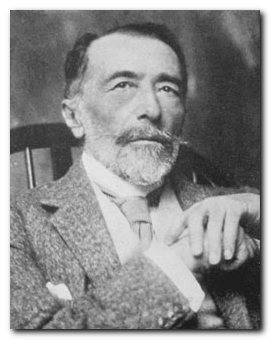
Joseph Conrad – portrait
Chance – critical commentary
The narrative
Chance sees the return of Marlow as a narrator after an absence of a decade or more. Marlow’s task is to assemble the facts of the narrative from a number of different sources, at different temporal levels, of events covering a time span of seventeen years. Some of these sources are people he has never met, and the information that comes from them is so indirect and convoluted, that one often wonders how reliable it can be.
This obliqueness, complexity, and self-referentiality was even more marked in the serial version of the story, which appeared before the novel. The serial included an outer narrator who is a novelist, reflecting on Marlow’s account of events. Conrad cut this out for publication as a novel, and left behind instead an un-named outer narrator who ‘presents’ what Marlow tells him.
In his later novels Conrad pushed the complexities of his narrative strategies more or less to the breaking point of credibility. In Nostromo for instance we are asked at one point to believe that a minute by minute, detailed description of violent events in a revolution is provided by a character writing a letter with a pencil stub in a darkened room.
Similarly in Chance, Marlow is constructing the drama of Flora de Barrall from events which cover a span of seventeen years, related to him largely by other people, some of whom were not even present at the occasions Marlow describes – often in great detail, including what the participants thought and felt. It’s as if Conrad forgets that he has invented some of the characters included in the chain of the narrative.
This weakness also has the effect of blurring the distinction between Marlow and Conrad as the true carrier of the narrative – despite the fact that there is an almost vestigial outer-narrator who is supposed to relaying Marlow’s account to us, and who could have been used to put a critical distance between Conrad and his narrator.
Since Marlow carries almost the entire weight of the narrative, this lack of critical distance has significant ramifications. For instance he repeatedly punctuates his account of events with quasi-philosophic reflections on the nature of women. These are what we would now call patronising at best and downright misogynist at worst. Very occasionally the outer-narrator interrupts him to express surprise – but Marlow’s opinions are never seriously challenged or questioned. Readers are given every reason to believe that Marlow is acting as a mouthpiece for Conrad.
The drama
There is an argument that Conrad reached the highest point of his achievement as a novelist in the period which includes Nostromo (1904), The Secret Agent (1907), and Under Western Eyes (1911).
Yet even the ending of Nostromo shows signs of being rushed. After 350 pages of dramatic conflict and revolution, the protagonist suddenly changes his customary behaviour and is shot, mistaken for somebody else, and that brings the narrative to an end.
Similarly in Chance the major characters are brought together for one final dramatic encounter on board the Ferndale. First the skulduggery which precipitates the climax is terribly melodramatic – a lethal potion slipped into a drink.
This event is seen by one character, who is watching a second, who is spying on a third – a sequence of improbabilities which might be straight out of a Thomas Hardy novel. And then the villain of the piece suddenly acts quite out of character and swallows his own poison.
And once all the problems have been dealt with, the hero of the novel is removed from the picture by a sudden accident – leaving the stage clear for a very unconvincing happy ending in which the two youngest people in the novel (Flora and Powell) are romantically linked.
The main problem with Chance is that unlike Heart of Darkness, The Secret Agent, and Under Western Eyes, it is not about anything very important. A financial dealer goes bankrupt, and his young daughter is ill-treated by the people who are supposed to be looking after her. She enters a curiously ‘chivalric’ marriage, of which her father disapproves. There is tension between her father and her husband; but when both of them die, she is free to face the prospect of life with a man her own age.
The central drama of the novel is supposed to revolve around the character of Flora – yet she never really comes to life. She is the passive victim throughout – adored by her husband and possessively regarded by her father who shows no signs of paternal affection for her. She marries Anthony in a daydream and appears to be entering into a similar relationship with Powell at the end of the novel. We do not see events from her point of view, and she expresses few emotions other than a feeling worthlessness in her low moments, and a saint-like patience with her father as he rants about her choice of husband.
Chance – study resources
![]() Chance – Oxford World’s Classics – Amazon UK
Chance – Oxford World’s Classics – Amazon UK
![]() Chance – Oxford World’s Classics – Amazon US
Chance – Oxford World’s Classics – Amazon US
![]() Chance – annotated Kindle eBook edition
Chance – annotated Kindle eBook edition
![]() Chance – eBook versions at Project Gutenberg
Chance – eBook versions at Project Gutenberg
![]() Chance – Online Literature
Chance – Online Literature
![]() The Cambridge Companion to Joseph Conrad – Amazon UK
The Cambridge Companion to Joseph Conrad – Amazon UK
![]() Routledge Guide to Joseph Conrad – Amazon UK
Routledge Guide to Joseph Conrad – Amazon UK
![]() Oxford Reader’s Companion to Conrad – Amazon UK
Oxford Reader’s Companion to Conrad – Amazon UK
![]() Joseph Conrad: A Biography – Amazon UK
Joseph Conrad: A Biography – Amazon UK
![]() The Complete Critical Guide to Joseph Conrad – Amazon UK
The Complete Critical Guide to Joseph Conrad – Amazon UK
![]() Notes on Life and Letters – Amazon UK
Notes on Life and Letters – Amazon UK
![]() Joseph Conrad – biographical notes
Joseph Conrad – biographical notes
![]() Joseph Conrad at Wikipedia – biographical notes, links
Joseph Conrad at Wikipedia – biographical notes, links
![]() Joseph Conrad at Mantex – tutorials, web links, study resources
Joseph Conrad at Mantex – tutorials, web links, study resources
Chance – plot summary
The celebrated financier de Barrall is a widow with a young daughter called Flora. She is looked after by a governess in Brighton whilst her father concentrates on expanding his business empire. He makes a large fortune by persuading people to invest, but is then disgraced and sent to jail when his business collapses. When the prospect of getting hold of some of de Barrall’s money disappears, the governess (and her shady accomplice) abandon Flora, and she is taken in by lower-class relatives who neglect her. She escapes from them and is then looked after by Mr and Mrs Fynes, where she is rescued by a momentary temptation to commit suicide by Marlow, the narrator of the the story.
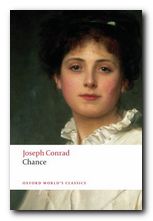 She also meets Captain Anthony, Mrs Fynes’ brother who falls in love with her and persuades her to marry him. Because of her life experiences, she feels unloved and worthless, but agrees to the marriage, which Anthony proposes will be ‘chivalric’ on his part. That is, recognising that she is not in love with him, he will make no demands on her (including sexual) but will defend her for the rest of her life.
She also meets Captain Anthony, Mrs Fynes’ brother who falls in love with her and persuades her to marry him. Because of her life experiences, she feels unloved and worthless, but agrees to the marriage, which Anthony proposes will be ‘chivalric’ on his part. That is, recognising that she is not in love with him, he will make no demands on her (including sexual) but will defend her for the rest of her life.
When her father is eventually released from prison, a broken man, Anthony makes provision for them both on board his ship, the Ferndale. Relations on board however become very strained. Franklin, the chief mate, is passionately attached to Captain Anthony and is jealous of his relationship with Flora. In addition, de Barrall cannot stand the sight of Anthony and regards the fact that Flora has married him as an act of betrayal on her part.
The climax of the story occurs when de Barrall tries to poison Anthony, but is overseen by Powell, the second mate. When de Barrall is exposed and realises that the game is up, he takes the poison himself and dies.
Anthony and Flora are free to continue their mariage blanc for six years until the Ferndale is involved in a collision at sea and Anthony goes down with the ship as the last man on board. Flora retires to the countryside and as the novel ends she is being encouraged by Marlow to entertain the attentions of Powell, with whose ‘chance’ employment on the Ferndale the novel began.
Biography
Principal characters
| Narrator | The un-named outer narrator who presents Marlow’s account of events |
| Marlow | An experienced sea captain, the principal narrator of events |
| Mr Powell | A shipping office employer, who gives Charles Powell his first chance of employment |
| Charles Powell | A young, recently qualified naval officer |
| Roderick Anthony | The captain of the Ferndale |
| Carleon Anthony | Captain Anthony’s father, a romantic poet |
| John Fyne | A civil servant, Anthony’s brother-in-law |
| Zoe Fyne | Captain Anthony’s sister, a radical feminist |
| Eliza | Governess to Flora in Brighton |
| Charley | The governess’s young ‘nephew’ and accomplice |
| Mr de Barrall | A famous financier who becomes bankrupt and goes to jail |
| Flora Barrall | Barrall’s young daughter |
| No name | de Barrall’s lower-class relatives who ‘abduct’ Flora |
| Franklin | First mate on the Ferndale who is passionately attached to Captain Anthony |
| Mr Brown | Steward on the Ferndale |
| Jane Brown | The steward’s wife who is companion to Flora |
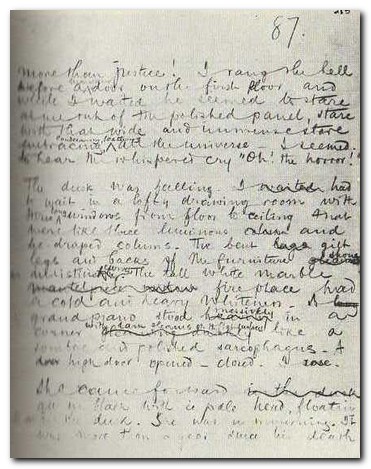
Manuscript page from Heart of Darkness
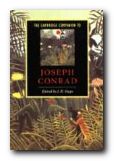 The Cambridge Companion to Joseph Conrad offers a series of essays by leading Conrad scholars aimed at both students and the general reader. There’s a chronology and overview of Conrad’s life, then chapters that explore significant issues in his major writings, and deal in depth with individual works. These are followed by discussions of the special nature of Conrad’s narrative techniques, his complex relationships with late-Victorian imperialism and with literary Modernism, and his influence on other writers and artists. Each essay provides guidance to further reading, and a concluding chapter surveys the body of Conrad criticism.
The Cambridge Companion to Joseph Conrad offers a series of essays by leading Conrad scholars aimed at both students and the general reader. There’s a chronology and overview of Conrad’s life, then chapters that explore significant issues in his major writings, and deal in depth with individual works. These are followed by discussions of the special nature of Conrad’s narrative techniques, his complex relationships with late-Victorian imperialism and with literary Modernism, and his influence on other writers and artists. Each essay provides guidance to further reading, and a concluding chapter surveys the body of Conrad criticism.
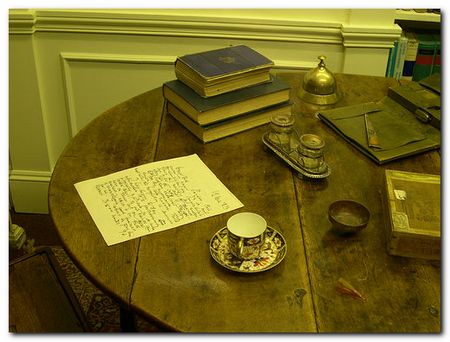
Joseph Conrad’s writing table
Further reading
![]() Amar Acheraiou Joseph Conrad and the Reader, London: Macmillan, 2009.
Amar Acheraiou Joseph Conrad and the Reader, London: Macmillan, 2009.
![]() Jacques Berthoud, Joseph Conrad: The Major Phase, Cambridge: Cambridge University Press, 1978.
Jacques Berthoud, Joseph Conrad: The Major Phase, Cambridge: Cambridge University Press, 1978.
![]() Muriel Bradbrook, Joseph Conrad: Poland’s English Genius, Cambridge: Cambridge University Press, 1941
Muriel Bradbrook, Joseph Conrad: Poland’s English Genius, Cambridge: Cambridge University Press, 1941
![]() Harold Bloom (ed), Joseph Conrad (Bloom’s Modern Critical Views, New Yoprk: Chelsea House Publishers, 2010
Harold Bloom (ed), Joseph Conrad (Bloom’s Modern Critical Views, New Yoprk: Chelsea House Publishers, 2010
![]() Hillel M. Daleski , Joseph Conrad: The Way of Dispossession, London: Faber, 1977
Hillel M. Daleski , Joseph Conrad: The Way of Dispossession, London: Faber, 1977
![]() Daphna Erdinast-Vulcan, Joseph Conrad and the Modern Temper, Oxford: Oxford University Press, 1991.
Daphna Erdinast-Vulcan, Joseph Conrad and the Modern Temper, Oxford: Oxford University Press, 1991.
![]() Aaron Fogel, Coercion to Speak: Conrad’s Poetics of Dialogue, Cambridge, Mass: Harvard University Press, 1985
Aaron Fogel, Coercion to Speak: Conrad’s Poetics of Dialogue, Cambridge, Mass: Harvard University Press, 1985
![]() John Dozier Gordon, Joseph Conrad: The Making of a Novelist, Cambridge, Mass: Harvard University Press, 1940
John Dozier Gordon, Joseph Conrad: The Making of a Novelist, Cambridge, Mass: Harvard University Press, 1940
![]() Albert J. Guerard, Conrad the Novelist, Cambridge, Mass: Harvard University Press, 1958
Albert J. Guerard, Conrad the Novelist, Cambridge, Mass: Harvard University Press, 1958
![]() Robert Hampson, Joseph Conrad: Betrayal and Identity, Basingstoke: Macmillan, 1992
Robert Hampson, Joseph Conrad: Betrayal and Identity, Basingstoke: Macmillan, 1992
![]() Jeremy Hawthorn, Joseph Conrad: Language and Fictional Self-Consciousness, London: Edward Arnold, 1979
Jeremy Hawthorn, Joseph Conrad: Language and Fictional Self-Consciousness, London: Edward Arnold, 1979
![]() Jeremy Hawthorn, Joseph Conrad: Narrative Technique and Ideological Commitment, London: Edward Arnold, 1990
Jeremy Hawthorn, Joseph Conrad: Narrative Technique and Ideological Commitment, London: Edward Arnold, 1990
![]() Jeremy Hawthorn, Sexuality and the Erotic in the Fiction of Joseph Conrad, London: Continuum, 2007.
Jeremy Hawthorn, Sexuality and the Erotic in the Fiction of Joseph Conrad, London: Continuum, 2007.
![]() Owen Knowles, The Oxford Reader’s Companion to Conrad, Oxford: Oxford University Press, 1990
Owen Knowles, The Oxford Reader’s Companion to Conrad, Oxford: Oxford University Press, 1990
![]() Jakob Lothe, Joseph Conrad: Voice, Sequence, History, Genre, Ohio State University Press, 2008
Jakob Lothe, Joseph Conrad: Voice, Sequence, History, Genre, Ohio State University Press, 2008
![]() Gustav Morf, The Polish Shades and Ghosts of Joseph Conrad, New York: Astra, 1976
Gustav Morf, The Polish Shades and Ghosts of Joseph Conrad, New York: Astra, 1976
![]() Ross Murfin, Conrad Revisited: Essays for the Eighties, Tuscaloosa, Ala: University of Alabama Press, 1985
Ross Murfin, Conrad Revisited: Essays for the Eighties, Tuscaloosa, Ala: University of Alabama Press, 1985
![]() Jeffery Myers, Joseph Conrad: A Biography, Cooper Square Publishers, 2001.
Jeffery Myers, Joseph Conrad: A Biography, Cooper Square Publishers, 2001.
![]() Zdzislaw Najder, Joseph Conrad: A Life, Camden House, 2007.
Zdzislaw Najder, Joseph Conrad: A Life, Camden House, 2007.
![]() George A. Panichas, Joseph Conrad: His Moral Vision, Mercer University Press, 2005.
George A. Panichas, Joseph Conrad: His Moral Vision, Mercer University Press, 2005.
![]() John G. Peters, The Cambridge Introduction to Joseph Conrad, Cambridge: Cambridge University Press, 2006.
John G. Peters, The Cambridge Introduction to Joseph Conrad, Cambridge: Cambridge University Press, 2006.
![]() James Phelan, Joseph Conrad: Voice, Sequence, History, Genre, Ohio State University Press, 2008.
James Phelan, Joseph Conrad: Voice, Sequence, History, Genre, Ohio State University Press, 2008.
![]() Edward Said, Joseph Conrad and the Fiction of Autobiography, Cambridge Mass: Harvard University Press, 1966
Edward Said, Joseph Conrad and the Fiction of Autobiography, Cambridge Mass: Harvard University Press, 1966
![]() Allan H. Simmons, Joseph Conrad: (Critical Issues), London: Macmillan, 2006.
Allan H. Simmons, Joseph Conrad: (Critical Issues), London: Macmillan, 2006.
![]() J.H. Stape, The Cambridge Companion to Joseph Conrad, Cambridge: Cambridge University Press, 1996
J.H. Stape, The Cambridge Companion to Joseph Conrad, Cambridge: Cambridge University Press, 1996
![]() John Stape, The Several Lives of Joseph Conrad, Arrow Books, 2008.
John Stape, The Several Lives of Joseph Conrad, Arrow Books, 2008.
![]() Peter Villiers, Joseph Conrad: Master Mariner, Seafarer Books, 2006.
Peter Villiers, Joseph Conrad: Master Mariner, Seafarer Books, 2006.
![]() Ian Watt, Conrad in the Nineteenth Century, London: Chatto and Windus, 1980
Ian Watt, Conrad in the Nineteenth Century, London: Chatto and Windus, 1980
![]() Cedric Watts, Joseph Conrad: (Writers and their Work), London: Northcote House, 1994.
Cedric Watts, Joseph Conrad: (Writers and their Work), London: Northcote House, 1994.
Other novels by Joseph Conrad
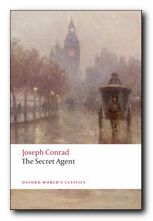 The Secret Agent (1907) is a short novel and a masterpiece of sustained irony. It is based on the real incident of a bomb attack on the Greenwich Observatory in 1888 and features a cast of wonderfully grotesque characters: Verloc the lazy double agent, Inspector Heat of Scotland Yard, and the Professor – an anarchist who wanders through the novel with bombs strapped round his waist and the detonator in his hand. The English government and police are subject to sustained criticism, and the novel bristles with some wonderfully orchestrated effects of dramatic irony – all set in the murky atmosphere of Victorian London. Here Conrad prefigures all the ambiguities which surround two-faced international relations, duplicitous State realpolitik, and terrorist outrage which still beset us more than a hundred years later.
The Secret Agent (1907) is a short novel and a masterpiece of sustained irony. It is based on the real incident of a bomb attack on the Greenwich Observatory in 1888 and features a cast of wonderfully grotesque characters: Verloc the lazy double agent, Inspector Heat of Scotland Yard, and the Professor – an anarchist who wanders through the novel with bombs strapped round his waist and the detonator in his hand. The English government and police are subject to sustained criticism, and the novel bristles with some wonderfully orchestrated effects of dramatic irony – all set in the murky atmosphere of Victorian London. Here Conrad prefigures all the ambiguities which surround two-faced international relations, duplicitous State realpolitik, and terrorist outrage which still beset us more than a hundred years later.
![]() Buy the book from Amazon UK
Buy the book from Amazon UK
![]() Buy the book from Amazon US
Buy the book from Amazon US
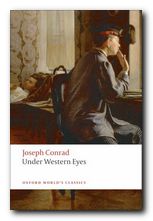 Under Western Eyes (1911) is the story of Razumov, a reluctant ‘revolutionary’. He is in fact a coward who is mistaken for a radical hero and cannot escape from the existential trap into which this puts him. This is Conrad’s searing critique of Russian ‘revolutionaries’ who put his own Polish family into exile and jeopardy. The ‘Western Eyes’ are those of an Englishman who reads and comments on Razumov’s journal – thereby creating another chance for Conrad to recount the events from a very complex perspective. Razumov achieves partial redemption as a result of his relationship with a good woman, but the ending, with faint echoes of Dostoyevski, is tragic for all concerned.
Under Western Eyes (1911) is the story of Razumov, a reluctant ‘revolutionary’. He is in fact a coward who is mistaken for a radical hero and cannot escape from the existential trap into which this puts him. This is Conrad’s searing critique of Russian ‘revolutionaries’ who put his own Polish family into exile and jeopardy. The ‘Western Eyes’ are those of an Englishman who reads and comments on Razumov’s journal – thereby creating another chance for Conrad to recount the events from a very complex perspective. Razumov achieves partial redemption as a result of his relationship with a good woman, but the ending, with faint echoes of Dostoyevski, is tragic for all concerned.
![]() Buy the book from Amazon UK
Buy the book from Amazon UK
![]() Buy the book from Amazon US
Buy the book from Amazon US
© Roy Johnson 2010
Joseph Conrad web links
![]() Joseph Conrad at Mantex
Joseph Conrad at Mantex
Biography, tutorials, book reviews, study guides, videos, web links.
![]() Joseph Conrad – his greatest novels and novellas
Joseph Conrad – his greatest novels and novellas
Brief notes introducing his major works in recommended editions.
![]() Joseph Conrad at Project Gutenberg
Joseph Conrad at Project Gutenberg
A major collection of free eTexts in a variety of formats.
![]() Joseph Conrad at Wikipedia
Joseph Conrad at Wikipedia
Biography, major works, literary career, style, politics, and further reading.
![]() Joseph Conrad at the Internet Movie Database
Joseph Conrad at the Internet Movie Database
Adaptations for the cinema and television – in various languages. Full details of directors and actors, production notes, box office, trivia, and quizzes.
![]() Works by Joseph Conrad
Works by Joseph Conrad
Large online database of free HTML texts, digital scans, and eText versions of novels, stories, and occasional writings.
![]() The Joseph Conrad Society (UK)
The Joseph Conrad Society (UK)
Conradian journal, reviews. and scholarly resources.
![]() The Joseph Conrad Society of America
The Joseph Conrad Society of America
American-based – recent publications, journal, awards, conferences.
![]() Hyper-Concordance of Conrad’s works
Hyper-Concordance of Conrad’s works
Locate a word or phrase – in the context of the novel or story.
More on Joseph Conrad
Twentieth century literature
More on Joseph Conrad tales
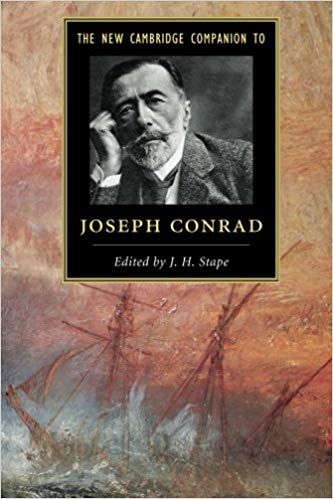
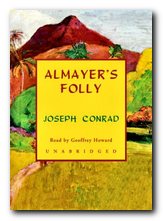 Almayer’s Folly
Almayer’s Folly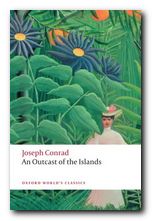 An Outcast of the Islands
An Outcast of the Islands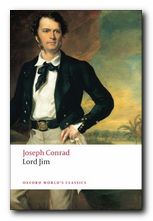 Lord Jim
Lord Jim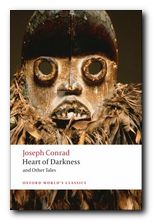 Heart of Darkness
Heart of Darkness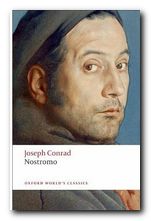 Nostromo
Nostromo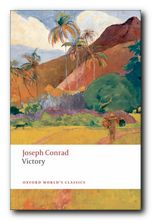 Victory
Victory